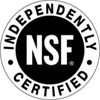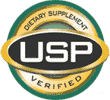|

Four
Websites List Quality Products and Companies
20
December 2002, links updated January 2007
by Wyn Snow, Managing Editor
Four
organizations currently perform quality testing and inspections—of
supplement products and/or manufacturing plants. Here are the quality
seals you can expect to see on products, together with links to
lists and/or databases on the corresponding websites.
What do these
quality seals mean?
1.
ConsumerLab.com
Independent
product testing:
ConsumerLab examines the research literature to understand the chemical
makeup of products that have been shown useful in clinical (i.e.,
human) research studies—and establishes standards of quality
for that product. It then selects popular brands for testing against
these standards, which include identity and potency, purity, bioavailability,
and consistency. [Go to ConsumerLab home page.] ConsumerLab also
has programs that test raw materials and screen supplements for
substances banned by athletic organizations (in particular, the
Olympics). For more information, see www.ConsumerLab.com.
(One must be a subscriber to access the full lists of products that
pass testing.)
2.
Natural Products Association (NPA, formerly NNFA)
Manufacturing
plant inspections:
NNFA's GMP Certification Program inspects manufacturing plants of
member companies to determine if they are complying with good manufacturing
practices (GMPs) developed by NNFA in collaboration with several
other industry trade organizations. These GMPs include standards
for quality control/assurance, cleanliness, checking identity and
potency of ingredients, and testing of final products for potency,
purity and bioavailability. (NNFA's GMP standards are the same as
those for NSF International.) [Go to the NNFA
list of certified companies.]
3.
NSF International
Manufacturing
plant inspections:
NSF International's International Standard for Dietary Supplements
uses the same set of criteria for good manufacturing practices as
NNFA. NSF International convened a committee of stakeholders—including
individuals from industry, government, and consumer groups—who
vote on the criteria in the standard. Negative votes must be resolved
before the standard is approved. As noted under NNFA above, these
GMP standards cover quality control/assurance, cleanliness, checking
identity and potency of ingredients, and testing of final products
for potency, purity and bioavailability. While NNFA's GMP Certification
Program is available only to NNFA members, any company can apply
for certification by NSF International. [Go to the NSF
International database of certified companies and products.
For a full list, leave the product search and manufacturer boxes
blank.]
4.
U. S. Pharmacopoeia (USP)
Independent
product testing and manufacturing plant inspections:
USP's Dietary Supplement Validation Program (DSVP) both tests final
products and inspects the plants where products are manufactured.
USP conducts an initial testing of products submitted to them by
the company, perform a inspections of manufacturing facilities,
practices, records, and quality control measures to ensure that
they meet USP requirements, and then conduct random marketplace
tests on products carrying the USP mark to ensure that they continue
to meet USP's standards over time. Criteria are established by a
committee of stakeholders from industry, government and consumer
groups. Product testing criteria include identity, potency, purity,
bioavailability, and GMPs. [Go to USP's
information about validated products and companies.]
What do these
criteria mean?
-
Identity
and potency: Does the product contain the ingredients
and dosage strength listed on the label?
-
Purity:
Is the product free of specific contaminants it should not have?
-
Bioavailability:
Does the product dissolve adequately for use in the body?
-
Consistency:
Does each tablet or other unit of the product have the same
identity, potency and purity?
-
Good
manufacturing practices
(GMPs): Does the manufacturing facility follow high-quality
standards for
-
NPA/NSFIn'tl:
procedures for quality control/assurance, cleanliness, checking
identity and potency of ingredients, and testing of final
products for potency, purity and bioavailability?
-
USP:
safe, sanitary and well-controlled procedures?
Sources
ConsumerLab
website.
Natural Products Association (NPA, formerly NNFA) website.
NSF
International website.
US
Pharmacopoeia (USP) website.
|